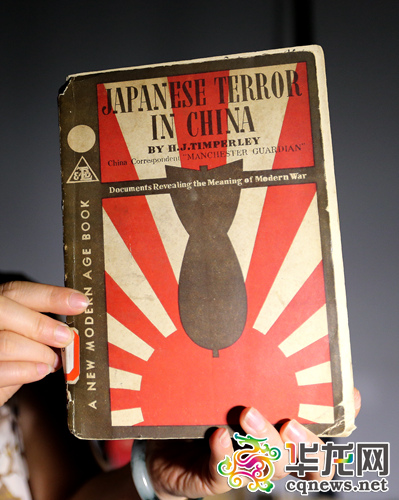 |
| Japanese Terror in China, written by Manchester Guardian's journalist H. J. Timperley, is collected in Chongqing Library. [Photo/cqnews.net] |
CHONGQING (CQNEWS) -- The clock of history once again points to China on 7th July. 77 years ago, on the same day, the War of Resistance against Japanese Aggression (1937-45) erupted, and the entire China's resistance gained today's peace and happiness. However, the Japanese terror was unforgetable: on this memorial day, through CQNEWS.NET only, Chongqing Library revealed the original version of the book Japanese Terror in China, which was written by Manchester Guardian's journalist H. J. Timperley.
Timperley used his diaries to record Japanese crimes in Nanjing during 1937-1938, both substantively and objectively. Timperley said the story he recorded was so sad that he could not think of anyone he knew that had a strong stomach to read it. "It is a story of such crime and horror as to be almost unbelievable."
So what kind of crime did Timperley say in his diary? The book was written in English, our journalist, who has two-year experience in English news reporting, spent a whole day reorganizing these snapshots from the book.
The book recorded Japanese crimes and was collected in Chongqing Library in 1947
Timperley wrote in the preface that the aim of this book is to give the world as accurately as possible the facts about the Japanese army's treatment of the Chinese civilians' population in the 1937-1938 hostilities so that war maybe stripped off the false glamour with which militarist megalomaniacs seek to invest it.
This book was the English version that first published in 1938. The director of documentation center in Chongqing Library Liu Xiaojing said it is the first time that the book and its content are revealed to the public.
"As I know, this type of book which was written by foreign journalist during the War of Resistance against Japanese Aggression (1937-45) is very rare in our library, this book recorded Japanese crimes in China during the war, both substantively and objectively," Liu said. "This kind of historical data is hard to find."
According to Liu, a Canadian scholar went to the library to search WWII documents; the library staff found out this book was broken and tried to repair it. They felt the story from the book was very similar to the movie The Flowers of War.
Where did this book come from? The seal of the book shows "collected by National Roosevelt Library". This library was the predecessor of Chongqing Library, which means the book was in the library when Chongqing Library established in 1947.
Dreadful Japanese soldiers broke into resedential houses 5 to 10 times a day
Timperley wrote down what he saw and heard of Japanese treatment during the Nanjing Massacre.
"Sunday, December 19th (1939),—A day of completely anarchy. Several big fires raging today, started by the soldiers, and more are promised. The American flag was torn down in a number of places. At the American Schol it was trampled on and the caretaker told he would be killed if he put it up again…" Timperley wrote that some houses were entered from five to ten times in one day and the poor people were looted and robbed and the women were raped.
Timperley once went to the Japanese Embassy with his friend hold a list of another 55 violent records. They told the ambassador and other Japanese officials that day was the worst day after Japanese army took over Nanjing. But the answer they heard was "we would try our best to make things better soon". Timperley knew that the embassy had little influence to the army, and the army had almost no control to the soldiers.
